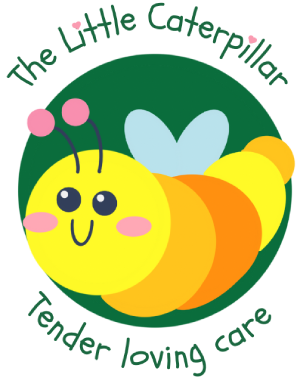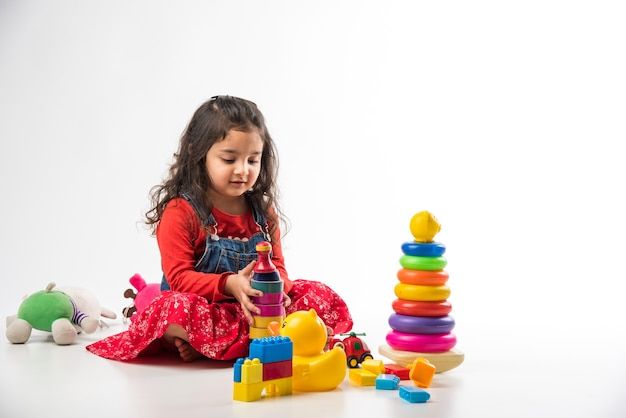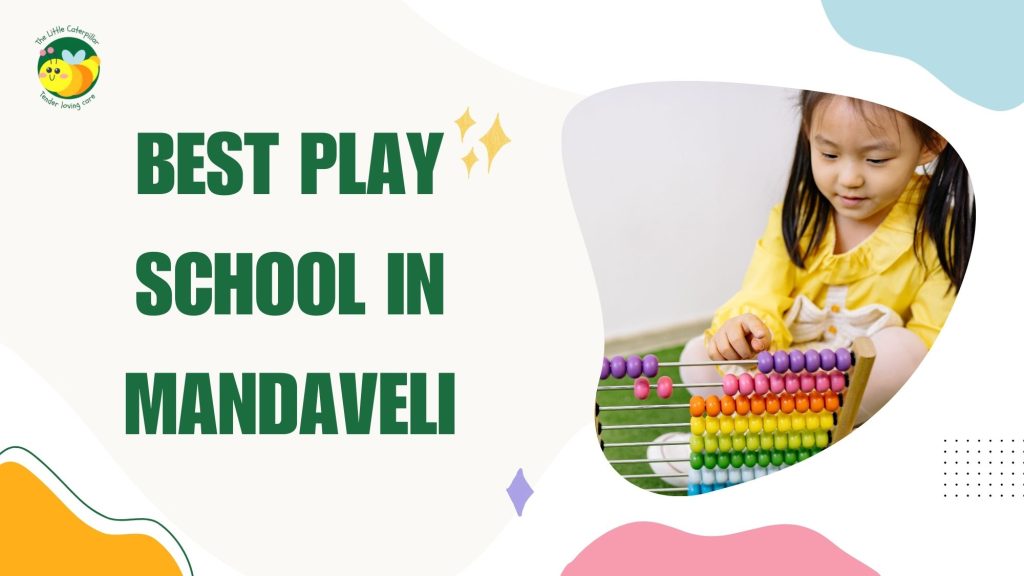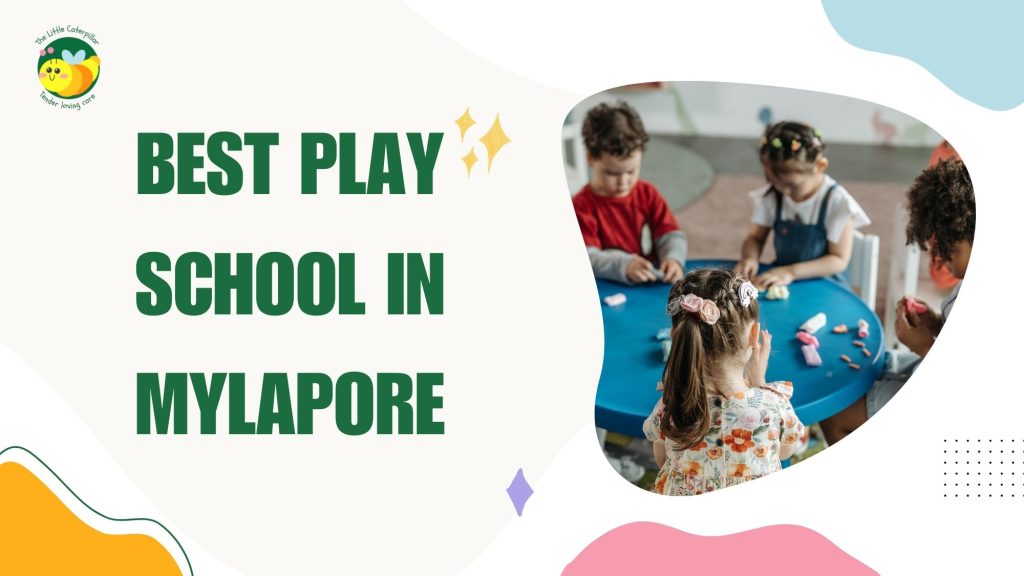Table of Contents
The Role of Play in Early Childhood Development: A Focus on Indian Heritage at The Little Caterpillar
Play is a vital part of early childhood development, laying the groundwork for a child’s cognitive, social, emotional, and physical growth. At The Little Caterpillar, a play school in Chennai, we recognize the transformative power of play and weave it seamlessly into our curriculum. By incorporating elements of Indian heritage, we offer a unique learning experience that fosters holistic development while connecting children to their cultural roots. This article explores the profound significance of play in early childhood and highlights how it is integrated into our curriculum at The Little Caterpillar.
Cognitive Development Through Play
Building Problem-Solving Skills
Play nurtures critical thinking and problem-solving abilities in young children. Activities like stacking blocks, solving puzzles, or creating structures require them to explore solutions, developing spatial awareness and logical reasoning in the process. According to Piaget’s theory of cognitive development, such hands-on experiences enable children to move through different stages of cognitive growth, sharpening their ability to think independently.
At The Little Caterpillar, we encourage children to engage in problem-solving tasks rooted in Indian contexts, such as arranging Rangoli patterns or creating traditional crafts. These activities not only boost their mental acuity but also introduce them to cultural artistry.
Fostering Creativity and Imagination
Creative play allows children to express their ideas, experiment, and stretch their imaginations. Activities like storytelling, drawing, or role-playing are essential for nurturing innovative thinking and cognitive flexibility. At our play school, traditional Indian elements like folk tales and Rangoli are integrated into creative sessions. For instance, children might act out Panchatantra stories or design colorful Rangoli, blending imagination with cultural learning.
Language Development Through Play
Play provides an ideal platform for children to build their language skills. Interactive activities like pretend play or group games require them to communicate, negotiate, and collaborate. These interactions enhance vocabulary, pronunciation, and sentence construction naturally and joyfully.
At The Little Caterpillar, we take language development a step further by incorporating Indian rhymes, folk songs, and storytelling traditions. Children are introduced to a rich linguistic heritage while learning essential communication skills, making language development an exciting and culturally enriching process.
Social and Emotional Development Through Play
Building Social Skills
Play is one of the most effective ways for children to learn how to interact with others. Through group games and collaborative activities, children learn to share, take turns, and cooperate with their peers. These experiences cultivate empathy and respect for others. Inspired by Vygotsky’s theory of social development, which emphasizes the importance of social interactions in learning, our curriculum encourages teamwork through engaging group activities.
Emotional Regulation Through Play
Through play, children can express their emotions and practice managing them. Pretend play and role-playing activities allow children to step into different characters, helping them understand diverse perspectives and develop emotional resilience. At The Little Caterpillar, we incorporate traditional Indian storytelling into these sessions, where children explore stories with emotional depth, teaching them how to navigate their own feelings in a culturally meaningful way.
Boosting Self-Confidence and Independence
Play enables children to gain a sense of accomplishment by overcoming challenges and completing tasks independently. This builds their confidence and fosters self-reliance. Activities like traditional crafts or yoga sessions, which are integral to Indian culture, help children develop these qualities. For example, creating a craft item like a diya during Diwali celebrations gives children a sense of pride in their abilities.
Physical Development Through Play
Developing Motor Skills
Physical play helps refine both fine and gross motor skills in young children. Activities like climbing, running, drawing, or manipulating objects improve coordination, strength, and dexterity. At The Little Caterpillar, traditional Indian games like Kabaddi and Kho-Kho are introduced to enhance motor development while celebrating cultural heritage.
Promoting Health and Well-being
Physical play is essential for maintaining good health and well-being. Activities that encourage movement not only improve fitness but also instill the value of an active lifestyle. Yoga, a cornerstone of Indian tradition, is a regular feature in our curriculum. It promotes flexibility, physical fitness, and mindfulness, making it a holistic addition to children’s playtime.
Connecting to Indian Heritage Through Play
Cultural Education Through Traditional Activities
Incorporating Indian heritage into play connects children with their cultural roots. Traditional games, art forms, and stories provide a rich and engaging context for learning while preserving cultural traditions. At The Little Caterpillar, we introduce activities like Bharatanatyam-inspired dance and puppet shows based on Indian folklore, helping children gain a deeper appreciation for their culture.
Teaching Values Through Play
Indian culture is deeply rooted in values and morals, often conveyed through stories and folklore. At our play school, children engage with moral tales from Panchatantra and Jataka, learning essential life lessons such as honesty, kindness, and perseverance. These stories are brought to life through play, ensuring that the lessons resonate deeply and meaningfully.
Celebrating Indian Festivals Through Play
Festivals offer vibrant opportunities for cultural learning and fun. At The Little Caterpillar, we celebrate festivals like Diwali, Holi, and Pongal with themed activities, crafts, and performances. For example, children may create colorful Holi art or participate in Pongal-themed role-plays, fostering a sense of community while learning about traditions.
The Role of Educators and Parents
Facilitating Play
Educators play a crucial role in facilitating play by creating a supportive and stimulating environment. At The Little Caterpillar, our teachers are trained to guide and observe children’s play, providing the right balance of structure and freedom. They introduce new materials, suggest ideas, and gently intervene to extend learning without dominating the play.
Encouraging Play at Home
Parents are encouraged to extend play at home by providing diverse play materials and opportunities. We conduct workshops and provide resources to help parents understand the importance of play and how to incorporate Indian cultural elements into their child’s playtime.
Collaborative Learning
Collaborative projects and parent-child activities are an integral part of our approach, fostering a strong partnership between home and school. This collaboration ensures that children receive a consistent and enriching play experience both at school and at home.
Conclusion
Play is a powerful vehicle for learning and development in early childhood. At The Little Caterpillar, we harness the benefits of play by integrating it with Indian cultural heritage, creating a unique and enriching educational experience for toddlers. By focusing on cognitive, social, emotional, and physical development through play, we lay a strong foundation for lifelong learning and well-being.
References
- Piaget, J. (1962). Play, Dreams and Imitation in Childhood. Norton.
- Vygotsky, L. S. (1978). Mind in Society: The Development of Higher Psychological Processes. Harvard University Press.
- Frost, J. L., Wortham, S. C., & Reifel, S. (2008). Play and Child Development. Pearson.
- Pellegrini, A. D. (2009). The Role of Play in Human Development. Oxford University Press.
- Singh, K. (2009). Indian Folk Tales and Legends. Rupa Publications.



